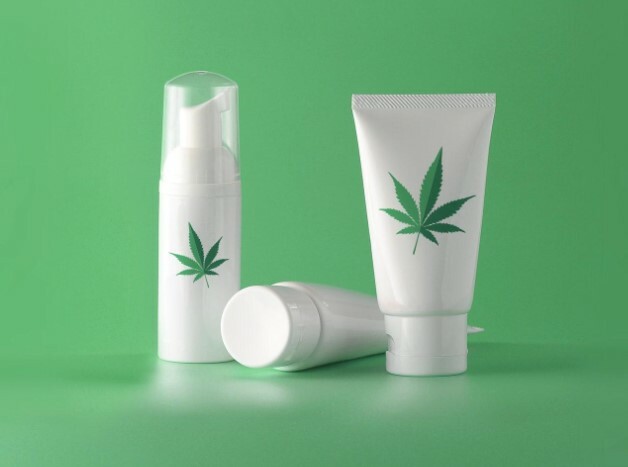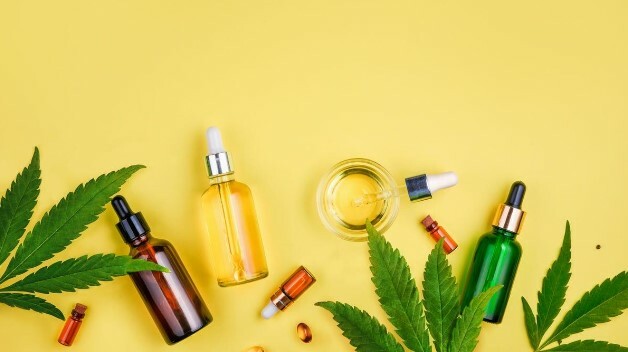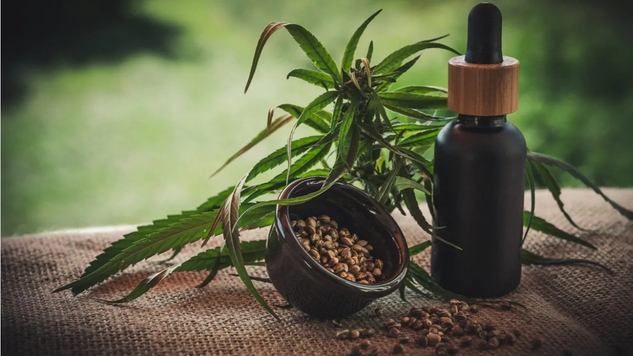How Can CBD Skincare Help You?

Cannabidiol, a natural compound of cannabis, is a popular remedy for pain, inflammation, stress, and insomnia. As CBD is not intoxicating, there's much active research on the use of CBD for the treatment of numerous health issues, including skin problems. This way, given the antioxidative and anti-inflammatory effects of CBD proven in clinical tests, the CBD skincare market has recently witnessed a boom.
But do CBD skincare products really work? What risks and potential side effects are associated with CBD inclusion in your skincare routines? Is it safe to use CBD-infused products for all user categories? This article will answer all these questions, and we'll provide a bonus tip – a tried and tested algorithm for choosing the best CBD skincare products.
Pure CBD vs. Hemp Oil
Don't rush to buy a tube of CBD cream only after seeing the "hemp" label on it. CBD comes in different forms that vary in skin effects and overall efficiency. So, doing some preliminary research is vital to choose a product that specifically meets your skin problems and needs. First, it's important to understand CBD oil and hemp oil distinction.
- CBD is extracted only from the hemp plant's leaves and flowers. These parts of the hemp plant include many other cannabinoids and terpenes, which create a rich phytonutrient profile of any CBD oil you use.
- Hemp oil is produced from the plant's seeds, as a rule, and it doesn't contain cannabinoids. So, hemp oil-enriched skin products will benefit you in terms of moisturization and delivery of vital fatty acids to your skin. However, it will not include any CBD.
Next, choosing CBD oil is also important for health-conscious users who want to know every constituent of their skincare products. You can choose from three CBD oil types:
- Full-spectrum CBD oil. The name of this CBD oil is self-explanatory; it's a raw, unrefined form of CBD oil that contains many other terpenes and cannabinoids from the hemp plant's chemical profile. Users who choose skincare products with full-spectrum CBD oil derive maximum value from the rich ingredients with anti-inflammatory and antimicrobial properties. However, it's vital to remember that full-spectrum CBD also comes with a tiny amount of THC, which may be problematic for some users.
- Broad-spectrum CBD oil. Broad-spectrum CBD oil is a purer form that contains no THC but is also poorer in terms of the terpene and cannabinoid variety. It’s an optimal choice for users who want to reap more benefits from the CBD oil’s chemical composition but at the same time want to bring the risks of THC use to zero.
- CBD isolate. This form is the purest CBD type, with no terpenes or additional cannabinoids in the composition. The isolate suits users interested in CBD only and don't want to risk taking any other components of the marijuana plant. It's also notable that CBD isolate is the safest consumption form with minimal risk of side effects and allergies, so you may start your acquaintance with CBD with skincare items containing CBD isolate and then try out other products.
As you can see, both CBD oil and hemp oil are beneficial for skin health. Still, one of them comes without CBD, which may confuse users. Besides, the CBD oil type should be chosen with proper caution, as some CBD oil forms contain intoxicating THC and may cause side effects.

CBD Skincare Benefits
Why is CBD getting so popular as a skincare ingredient? Let’s have a look at the clinical evidence of CBD benefits for your skin and the mechanisms of CBD's impact on the human body.
The most important fact to consider about CBD is that it binds to the endocannabinoid system in the human organism. This system is responsible for many body processes, one of which is an inflammatory response. This way, by decreasing the number of interleukins produced in the human body, the endocannabinoid system tuned down by CBD can guarantee better skin quality and reduce the intensity of skin inflammation.
Due to this chemical effect, CBD has found practical use in skincare. You can try CBD-infused products if you have the following skin issues.
- Dry skin. CBD acts as a great moisturizer, so it’s often included in skincare products for dry and irritated skin. The nourishing and moisturizing effect can help improve your skin tone, especially if you have a dull, aging skin type.
- Acne. CBD's anti-inflammatory and soothing properties help patients with acne reduce inflammation and manage this skin problem with fewer breakouts. Thus, prolonged CBD use in skincare can reduce the problem's severity and improve skin conditions.
- Aging and wrinkles. CBD's moisturizing and antioxidative properties make it effective in anti-aging skincare applications. Skin tone gets firmer, and dull skin acquires a healthy glow, which is effective in the long run.
- Skin infections. One of CBD's medical benefits is its antifungal and antimicrobial effects. Thus, CBD-infused skin products can also become a vital remedy for skin infections.
As you can see, the list of benefits is long and attractive. CBD is very popular in the skincare industry today, and the beneficial legal changes allow greater use of CBD in over-the-counter supplements and skincare products. So, you have a unique chance to try CBD-enriched skincare items and feel the value of CBD on your skin.
Formulation and Storage Tips
There is no clinically accepted concentration of CBD in skincare products. However, dermatologists advise using 1% of CBD per the skin care product’s volume, as higher concentrations can cause overdosing.
Now, a couple of words about storage. Like any other organic skincare product, your CBD-infused cream requires special conditions. So, ensure your cream or serum is stored in a cool, dry, and dark place where the temperature doesn't exceed 400C.
Precautions against CBD Skincare
Besides the immense value that CBD inclusion in skin care products brings, as with any other natural ingredient, CBD comes with specific risks and precautions. As a responsible and health-conscious user, you should keep those issues in mind to avoid negative experiences and allergies.
- Limited clinical evidence. As you may see from officially published research sources, CBD use in skincare is a loosely researched area. CBD has only recently entered the medical and skincare world, so most claims about its effectiveness are anecdotal evidence and marketing. Thus, you should consider regulatory issues surrounding CBD use in skincare and carefully check the product's labeling before making a decision about the purchase.
- Pregnancy and breastfeeding. CBD doesn't produce an intoxicating effect, but it's still a substance derived from marijuana, and the full spectrum of its impact on the human organism is not well known. Thus, it's not recommended for pregnant and breastfeeding women to avoid the potential side effects for the child.
- Underaged users. CBD’s effects are not well understood yet, so it’s essential to keep the risks to a minimum. For this reason, CBD-infused skincare items are not recommended for users that haven’t yet reached the age of 18 years old.
- Side effects. CBD application to your skin usually doesn't have pronounced side effects compared to oral CBD intake. However, it may adversely affect sensitive and allergic skin by causing a rash. Thus, dermatologists advise applying a small amount of the CBD-enriched product to their skin for a skin test and watching the effect for 24 hours. You can use the CBD cream or serum as recommended if no allergy surfaces.
- Labeling and documentation check. A quality check should be a vital part of your product selection process, as there are too many brands out there, and not all of them deliver upon their quality, purity, and safety promises. In most cases, the unsatisfactory experiences of users with CBD skincare result from poor-quality ingredients or CBD contamination with pesticides, herbicides, or heavy metals. Thus, it’s important to study the company’s reputation, check the origin of its hemp, and review the third-party lab test results for a full understanding of the product's ingredients.
The CBD market is very young, so users need to be in control of their purchase decisions by accessing the products' quality and COA reports on their own. Unethical advertisers and manufacturers are tempted to use poor-quality raw materials or chemical extraction methods to reduce production costs, so it's essential to find the right brand that can deliver organic, safe, and fully tested skin products for your safe use.
Are CBD Skincare Products Worth Considering?
As you can see from the list of risks and benefits associated with CBD use listed in this article, CBD is indeed a worthy component for skincare products that promise visible antifungal, anti-inflammatory, moisturizing, and antioxidative effects on the user's skin. Thus, it can become a handy supplement to your skincare regimen by treating dull, weakened skin and minimizing the inflammation of skin problems. However, CBD is a compound with a short history of research, so it should be treated cautiously and tested before full-scale use to avoid allergy, overdosing, and other health risks. It's also vital to conduct a rigorous check of the product's certificate of analysis by independent certified labs to avoid skin problems and intoxication with poor-quality cosmetic ingredients.
To read the latest guides, news, and features you can visit our Other Game Page.





